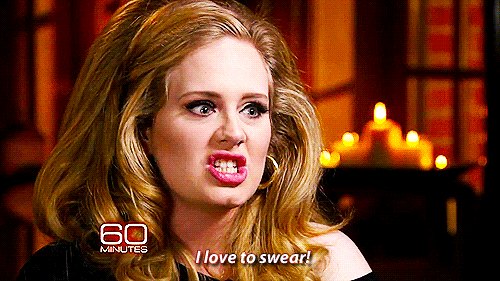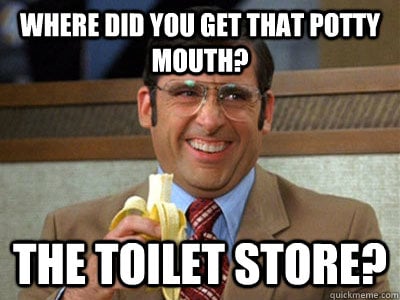Why Cursing In Another Language Feels So D*** Good
Photo via MemeSuper
A stubbed toe. That moment when you press send on a message that you really, really shouldn’t be sending. Waking up the morning after a night where go for a beer turned into doing shots.
You know the word.
We teach children that it’s rude to swear, cringe when they blurt out profanities learned on the playground, flinch when we let out an expletive or seven ourselves around sensitive ears, young and old. Yet when we do it in a language other than our own tongue, it feels, somehow, less offensive.
Why is that?
Getting it out…
**side eyes those of you snorting**
So, we know why we swear. And to be honest, there are worse ways of expressing the way we are feeling than to use words that once would have earned you a bar of soap in your mouth for your trouble. And if you’re surrounded by people who would take offense at hearing such an outburst, having another tongue to say it in not only offers that relief you get from swearing, but also that euphoric, sneaky feeling of doing something wrong in public. **side eyes those of you snorting again…**
Don’t believe us? Who didn’t giggle in front of our parents, saying the word merde when we learnt French in school. Who didn’t do the same with the Spanish joder, or even German (we won’t write that one out because it’s far too close to English, and that wouldn’t do for our PC eyes).
See what we did there? Why does it seem less wrong to write out profanities in other languages, but hold back on doing the same in our own language (at least, in a public platform; you should see our private emails…)?
Out loud…
The same is true, on a larger scale, when we speak. This writer, for instance, has no problem at all peppering their language with the odd perkele when they’re going about their day and things aren’t going to plan, but on hearing the full, uncut version of Eminem’s Girls in an amusement park in Helsinki, pull this face:

GIF via Giphy
The same is true when teaching English as a foreign language. A student swears in their own language and apologises for it, the teacher thinks it’s sort of cute, endearing in a way (and squirrels the word away for later use themselves). But if that same student uses an English swear word, maybe the teacher doesn’t get offended by it as such, but there’s still that little jolt to the stomach that says this is wrong (often accompanied by an, I’m so proud…)
And in a multinational group of friends, who hasn’t played the drinking game when everyone says cheers in as many languages as possible… when hasn’t it degenerated into learning new profanities in foreign tongues (maybe that’s just us…)?
Softening the blow…
This scenario has a label (of course it does. What in this world doesn’t?). It’s called, reduced emotional resonance of language. Which essentially means, at least in this scenario, swearing in another language doesn’t feel as bad; there’s less connection to the power of the words. Why is that? We’re not sure. Those studying this phenomenon know it happens, but as yet haven’t really found patterns suggesting why.

GIF via Giphy
So is it a bad thing? Profanity is just another facet of vocabulary, after all, and expressing yourself is just another part of communicating. Some might argue that learning swear words in another language is not the way to go about expanding your own personal vocabulary, that you even risk offending those whose language you are swearing in. We say; may we introduce you to common sense? If you wouldn’t swear in front of your own grandmother, why would you swear in front of someone else’s, just because their native language is not your own? It’s not hard.
Learning a new language? Check out our free placement test to see how your level measures up!
If we talk about the reduced emotional resonance of language as a whole, incorporating the use of swearing in that umbrella term, it can actually be a positive thing for those of us who are bilingual. If you are less-emotionally attached to a subject because you’re viewing it in a language other than your own, surely that leads to more logical, rational thinking and decision-making.
And as well as this, there’s also the good old fitting in; if you’re lucky enough to be moving to another country, we guarantee you’ll be dropping your prim and proper language use outside of your profession, learning all the ways you can cuss in the local tongue.
Swearing: key to bilingualism? We’re not sure. But do what you want with it; it’s your tongue.



